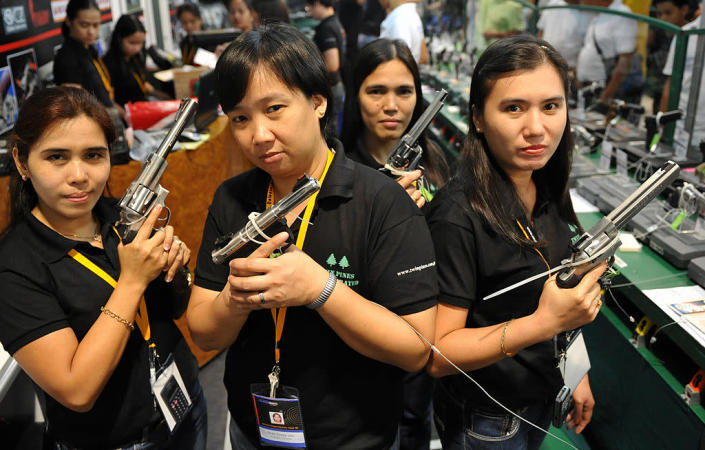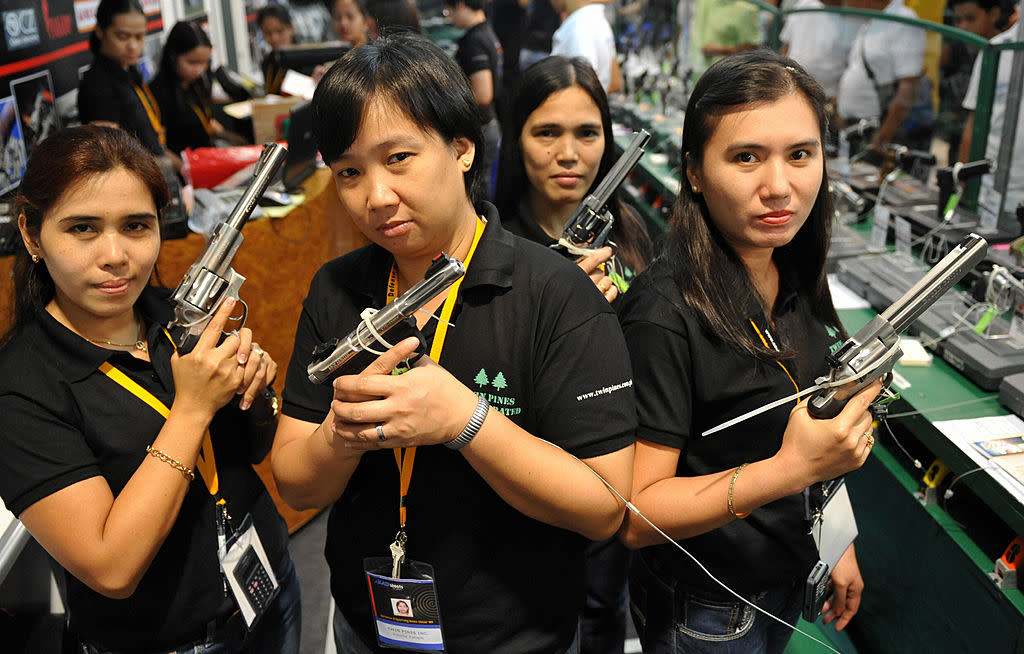
Shop assistants pose with various handguns at the Defense and Sporting Arms show at a mall in Manila on Jul 16, 2009. Credit – TED ALJIBE/AFP via Getty Images
Mass shootings are the result of a confluence of factors, but at the heart of the problem are weapons – of which the Philippines has plenty. Firearms are sold openly in shopping centers and almost anyone can carry them, even priests and accountants.
Fixers can reportedly handle formalities that hinder gun ownership, such as drug and psychological tests, and there are an estimated four million firearms in the country of 110 million people. Hundreds of thousands of weapons are illegally owned. Poverty, corruption, crime and outgoing President Rodrigo Duterte’s brutal war on drugs have left deep social scars.
There is no consensus in the Philippines on what distinguishes a mass shooting from other gun deaths, but random killings are uncommon. When eight people died and 11 were injured after a drunken gunman began shooting wildly in southern Cavite province in 2013, the tragedy was notable for its rarity.
Just to be clear: murders with firearms to be a fact of life in the Philippines. Hitmen can be hired for as little as $300. In fact, the Philippines is one of the deadliest places in Asia when it comes to gun homicides. The country saw more than 1,200 intentional homicides involving firearms in 2019. This meant that one in 100,000 people in the Southeast Asian country was killed by firearms – one of the highest rates in Asia. (In 2020, the comparable figure for the US is four.)
From the archives: Inside Rodrigo Duterte’s Drug War
Elections can be particularly bloody times, with deadly attacks on polling stations and political rivals. One of the worst killings in the country, the Maguindanao massacre in 2009 of 58 people, took place during gubernatorial elections. But it was a political atrocity. Shootings that have nothing to do with politics or crime are uncommon – and nothing has been as extreme as Columbine, Sandy Hook or Uvalde.
“I think it’s only a matter of time,” said Gerry Caño, dean of the School of Criminology and Criminal Justice at Cagayan de Oro College. “I think our authorities and public safety practitioners are just waiting for that time to come, as Philippine culture is heavily influenced by the West, especially the United States.”
But for now, powerful social factors continue to curb indiscriminate violence. Filipino academic Raymund Narag, an associate professor of criminology at Southern Illinois University and himself a former inmate, says mass shootings in his native country are partly deterred by Hello, a Tagalog word meaning shame or embarrassment. avoiding Helloand saving your family and community from it, is often described as a core Filipino value.
“It reflects on you and on your family,” says Narag. “When I was imprisoned, our entire clan felt humiliated.”
Gun culture in the Philippines
While the right to bear arms is not enshrined in the country’s constitution, as it is in the United States, there is no denying the Filipino love of guns.
When the US colonized the Philippines in the early 1900s, private individuals were allowed to possess powerful weapons for “lawful purposes” and for hunting. After Ferdinand Marcos declared martial law in 1972, owners were limited to one weak rifle and a pistol or revolver — and both had to be licensed. But in 2000, President Joseph Estrada lifted these limits and allowed civilians to own as many weapons as they wanted, of any type and caliber.
A 2013 law established qualifications for owning guns and carrying them in public. Licensed gun owners were required, among other things, to be 21 years old and to attend a firearms safety seminar. Depending on their license, most owners could own up to 15 pistols, rifles and shotguns (collectors are allowed to have more than 15). Licenses were issued for a period of 10 years.
Before running for president, Estrada was a gun-wielding hero in action movies — a genre loved by Filipinos because it played machismo and depicted gunfights as legitimate forms of defense in a crime-ridden country. The action movie craze has certainly helped Filipinos embrace gun culture.
Read more: These countries have restricted assault weapons after just one mass shooting
In some of the country’s poorest communities, guns became a common sight among warring gangs, buying cheap firearms from illegal sellers. Shooting clubs were opened for those with more money and an interest in target shooting. Many affluent Filipinos started collecting weapons, while the wealthiest citizens enthusiastically started arming their bodyguards.
But despite the glorification of firearms, when gun violence takes place, the victims are rarely random spectators in movie theaters or shopping malls. Nearly a quarter of the Philippine population falls below the poverty line, and “money or pay seems to be the best motivator” in many murder cases involving firearms, Caño says.
In January, a county hit man admitted to committing his crime in exchange for $500 to help his child, who was suffering from meningitis. In April, another gunman confessed to killing a mechanic for $400.
How Hello plays a role in social control
Narag says the strong ties of Filipino kinship mean people with problems are more likely to be identified before they become mass shooters. He contrasts that with the situation in the US, where he currently lives and teaches.
“Here, if you’re having problems, you should see a health professional,” he tells TIME. ‘You tell everything there. You don’t talk to your neighbors – sometimes you don’t talk to your own parents – because [there isn’t] an engaged culture where one’s own problem is everyone’s problem.”
Jose Antonio Clemente, professor of social psychology at the University of the Philippines, says community is everything. “From an early age, we were trained to give importance to our families and our relationships,” he says. “Maybe at some point we will also be taught to value our community, as there are many communities that are very close-knit because of the high population density.”
Read more: We must take action to tackle the mental health crisis
The National Police has protocols for mass shootings. Authorities have also suggested strengthening police on college campuses to deter insurgent groups from recruiting students. But it seems that ingrained values in the Philippines keep people from using guns indiscriminately.
Whether that is sufficient is up for debate. For now though Hello means you can’t “just start shooting people,” says Narag. “Because when that happens, you know the community won’t support you.”

